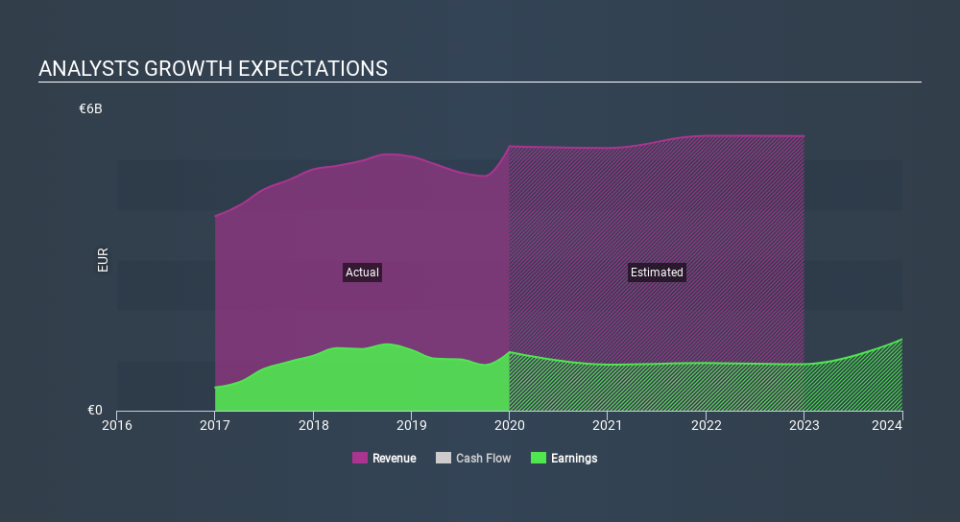Should You Investigate Raiffeisen Bank International AG (VIE:RBI) At €15.90?

Raiffeisen Bank International AG (VIE:RBI), operating in the financial services industry based in Austria, received a lot of attention from a substantial price increase on the WBAG over the last few months. As a mid-cap stock with high coverage by analysts, you could assume any recent changes in the company’s outlook is already priced into the stock. However, could the stock still be trading at a relatively cheap price? Today I will analyse the most recent data on Raiffeisen Bank International’s outlook and valuation to see if the opportunity still exists.
See our latest analysis for Raiffeisen Bank International
What is Raiffeisen Bank International worth?
According to my price multiple model, which makes a comparison between the company's price-to-earnings ratio and the industry average, the stock price seems to be justfied. I’ve used the price-to-earnings ratio in this instance because there’s not enough visibility to forecast its cash flows. The stock’s ratio of 4.49x is currently trading slightly below its industry peers’ ratio of 6.36x, which means if you buy Raiffeisen Bank International today, you’d be paying a reasonable price for it. And if you believe Raiffeisen Bank International should be trading in this range, then there isn’t much room for the share price to grow beyond the levels of other industry peers over the long-term. So, is there another chance to buy low in the future? Given that Raiffeisen Bank International’s share is fairly volatile (i.e. its price movements are magnified relative to the rest of the market) this could mean the price can sink lower, giving us an opportunity to buy later on. This is based on its high beta, which is a good indicator for share price volatility.
What kind of growth will Raiffeisen Bank International generate?
Investors looking for growth in their portfolio may want to consider the prospects of a company before buying its shares. Buying a great company with a robust outlook at a cheap price is always a good investment, so let’s also take a look at the company's future expectations. However, with an extremely negative double-digit change in profit expected over the next couple of years, near-term growth is certainly not a driver of a buy decision. It seems like high uncertainty is on the cards for Raiffeisen Bank International, at least in the near future.
What this means for you:
Are you a shareholder? RBI seems priced close to industry peers right now, but given the uncertainty from negative returns in the future, this could be the right time to reduce the risk in your portfolio. Is your current exposure to the stock optimal for your total portfolio? And is the opportunity cost of holding a negative-outlook stock too high? Before you make a decision on RBI, take a look at whether its fundamentals have changed.
Are you a potential investor? If you’ve been keeping tabs on RBI for a while, now may not be the most optimal time to buy, given it is trading around industry price multiples. This means there’s less benefit from mispricing. In addition to this, the negative growth outlook increases the risk of holding the stock. However, there are also other important factors we haven’t considered today, which can help gel your views on RBI should the price fluctuate below the industry PE ratio.
Price is just the tip of the iceberg. Dig deeper into what truly matters – the fundamentals – before you make a decision on Raiffeisen Bank International. You can find everything you need to know about Raiffeisen Bank International in the latest infographic research report. If you are no longer interested in Raiffeisen Bank International, you can use our free platform to see my list of over 50 other stocks with a high growth potential.
If you spot an error that warrants correction, please contact the editor at editorial-team@simplywallst.com. This article by Simply Wall St is general in nature. It does not constitute a recommendation to buy or sell any stock, and does not take account of your objectives, or your financial situation. Simply Wall St has no position in the stocks mentioned.
We aim to bring you long-term focused research analysis driven by fundamental data. Note that our analysis may not factor in the latest price-sensitive company announcements or qualitative material. Thank you for reading.

